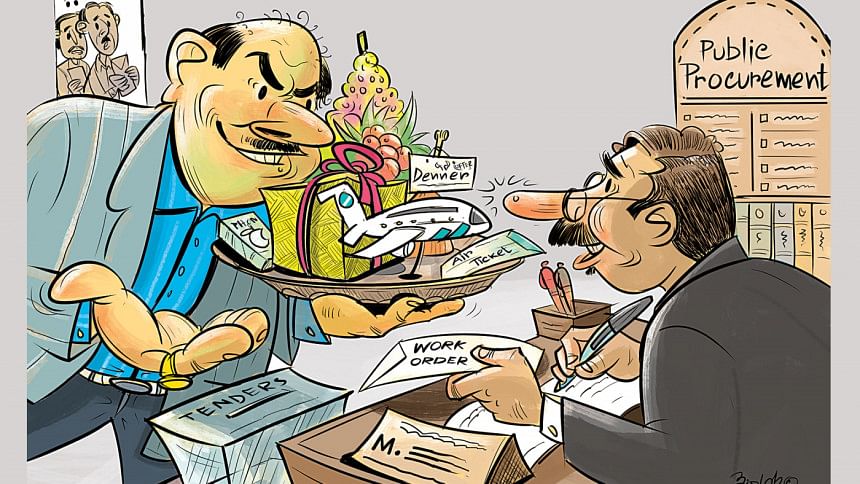Govt procurement process riddled with corruption

A World Bank study has, unsurprisingly, found various corruption and discrepancies in the Bangladesh government's public procurement process. Although it is well known that the process is riddled with problems, the extent of these, as revealed by the study, is simply astounding. Bidders apparently need to give bribes in the form of financial benefits, arrange trips and host dinners for government officials to win public procurement contracts. And large bidders are increasingly monopolising the procurement markets, while small bidders are largely ignored.
About 31 percent of the surveyed bidders said they had offered gifts of more than USD 300 to procuring entity officials or others to tilt procurement decisions in their favour. Some 62 percent of bidders admitted to having given gifts worth above Tk 25,000 and 17 percent gave gifts below that amount to sway public officials. Moreover, 17 percent paid for dinners for government officials and 4 percent invited officials to trips, the study said. According to these statistics, it seems that public officials are getting bribed for nearly every single procurement decision!
What is even more worrisome is that bidders are often unlawfully granted information on the official cost estimates of bidding process, which are strictly confidential. Amidst this cesspool of corruption, no official has been prosecuted for any illegal behaviour—no wonder corruption in this sector has become so entrenched.
Favouritism is another major problem in the bidding process, as politically connected bidders often get picked over others. This is leading to greater and greater monopolisation of the sector already dominated by large contractors and will surely discourage honest and small bidders, even though the number of average bidders per contract is terribly low as it is.
The main loser as a result of this widespread corruption is the public. Cost escalation, project delays, etc. have become a common theme in Bangladesh. But when bidders are selected based on political connection or bribes, how can they be expected to fulfil their contract obligations on a timely and cost-effective manner?
The government has turned a blind eye to this for long enough. It is high time the government brought transparency and accountability to the procurement process. The World Bank has given a number of recommendations that can help reduce anomalies. Besides implementing them, the government must enforce strict monitoring of the bidding process and exemplarily punish those who try to illegally influence decisions.

 For all latest news, follow The Daily Star's Google News channel.
For all latest news, follow The Daily Star's Google News channel. 



Comments